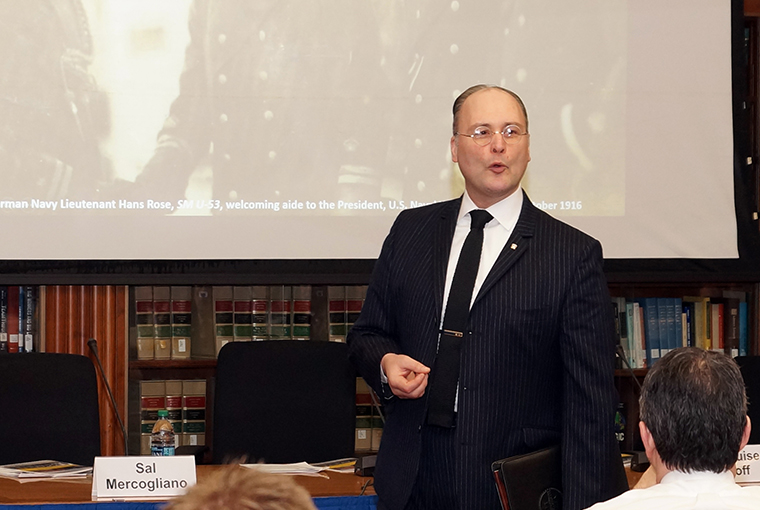U.S. Naval War College Hosts Naval History Conference on Lessons From WWI, the Legacy of William Sims

NEWPORT, R.I. -- One hundred years ago, U.S. Navy Adm. William Sims returned triumphantly to Newport to reopen the shuttered U.S. Naval War College at the end of World War I.
In celebration of that milestone, scholars of naval history gathered in the college’s Mahan Reading Room on March 14 and 15 to examine the naval lessons of the “Great War” and discuss how they might inform today’s Navy.
“You all contribute to probably the most important thing that we do, that’s using our voice to understand history and how it contributes to the future,” Rear Adm. Jeffrey Harley, college president, told the group in his welcoming remarks.
“You get away from the mere recitation of facts, and use history as a tool for decision -making.”
The conference’s title – The Victory at Sea: Naval Lessons of the Great War and the U.S. Navy of the 21st Century – is a nod to Sims’ Pulitzer Prize-winning 1920 book, “The Victory at Sea,” about the Navy’s role in WWI.
Returning to the college as its president in April 1919, after presiding over U.S. naval operations in Europe, Sims is credited with overhauling the school’s curriculum during the interwar period.
Speakers at the conference discussed Sims’ legacy, the revolution in professional naval education after WWI and the Naval War College’s historical influence as an international forum for scholarship on naval strategy.
“Sims comes back and just his very presence in Newport is really a significant strategic development,” said David Kohnen, director of the college’s John B. Hattendorf Center for Maritime Historical Research and organizer of the conference.
“He came back to the Naval War College to teach the Navy how to think about the future.”
Kohnen said that amid today’s debate about education in the Navy, and the recent release of the Education for Seapower report, history shows that leaders of the 20th century Navy valued teaching.
“All of the major, five-star thinkers of the second world war understood the importance of education, understood the strategic importance of the Naval War College, understood the importance of us studying our trade and our craft,” said Kohnen, who is a retired Navy officer. “Not just training – we know what port and starboard are. You have to understand the deeper arc of war.”
Bringing history almost to life, Sims’ grandson, Nathaniel Sims, spoke at the event, as did Nicholas Jellicoe, grandson of Adm. Sir John Jellicoe. John Jellicoe commanded Britain’s Grand Fleet during the Battle of Jutland in 1916.
Nathaniel Sims, who is a cardiac anesthesiologist and biomedical engineer in Boston, talked about what he has learned from his grandfather’s personal papers – including a poem by William Sims that his wife had marked “never publish.”
Despite William Sims’ success in Europe and his return to fanfare in the United States, the admiral appeared to be discontent when he returned to Newport, Nathaniel Sims told the conference.
Nathaniel Sims’ conclusion is that his grandfather felt slighted by the Navy’s decision to revert his rank to rear admiral – two stars – upon returning to the Naval War College. Sims had been temporarily promoted to four-star admiral around the end of the war – and much later, after retirement in 1930, was permanently promoted to four stars.
“Perhaps somewhere in Sims’ consciousness was this feeling like he had pulled this giant rabbit out of a hat, in terms of conducting the war and helping the Navy to win the war, and maybe he should keep those four stars,” Sims said.
Kohnen pointed out that it wasn’t unheard of for naval officers at the time to move up and down in the upper ranks. He also noted that the Navy was only congressionally allotted 30 flag positions at the time, while Sims made 31.
Nicholas Jellicoe never met his grandfather, who died in 1935, but the pull of history prompted him to help spearhead the 2016 Jutland Centenary Initiative, which aimed to share the story and lessons of the controversial naval battle with new generations.
Jellicoe said he believes that most Britons have lost sight of their nation’s naval history.
“One hundred years later, we’ve gone from a nation which was so thoroughly involved and cognizant of its naval heritage to one that’s almost sea blind,” he said.
Also at the conference, the 2019 Edward S. Miller Fellowship was awarded to Yale University undergraduate Ruth Schapiro. The annual fellowship goes to a promising student of history to conduct research in the Naval War College archives.
